Napalm Death are an influential British grindcore band formed in 1981. Early on, their lineup had some, uh, stability issues, but their most well-known and longest-running one—vocalist Mark “Barney” Greenway, guitarist Mitch Harris, bassist Shane Embury, and drummer Danny Herrera—have made a handful of the best grind records ever. And that’s in spite of having a decade-long identity crisis in the ‘90s that’d make Jason Todd cringe. Their whiplash-inducing, whirling dervish (death)grind is practically a trademark at this point, as is Greenway’s feral bark that sounds like he’s either gargling phlegm or drowning in it. As the primary lyricist, Greenway specializes in trenchant sloganeering such as “Heads to marvel at plastic landscapes / Heads to fill a vacuum of synthesized grace.” Embury, conversely, tends to write, let’s say, more abstractly: “Lucid-inducing swarm / Becoming closer but getting colder / The caustic grip insane.” Indeed, he’s generated enough word salad over his career to end world hunger. But the often-maniacal songwriting is the appeal here, because like a Boeing airplane, these guys have a few screws loose. Let’s appreciate their art of making noise, shall we?
16. Fear, Emptiness, Despair (1994)
 Napalm Death’s least-essential album answers the unfortunate question, “What if Napalm Death went trend-chasing?” This well-played record is notable for being the first one that had the same lineup as the previous one, “Utopia Banished.” As such, its focus on being a messy experiment of popular metal styles of the early ’90s is commendable: there’s a bit of groove metal, a bit of nu metal, and a bit of alt-metal all thrown together. What there isn’t much of is grindcore. And its lyrics mirror that Confused Nick Young meme—e.g., “Accept the ordeal, bar-coded / Cut the deals, downloaded / Succession strains” and “To grasp greedily, a freedom from pride / A binding force, a source of strength.” Overall, “Fear, Emptiness, Despair” is an intriguing listen, but not for a good reason. For grind fans, the title kinda says it all.
Napalm Death’s least-essential album answers the unfortunate question, “What if Napalm Death went trend-chasing?” This well-played record is notable for being the first one that had the same lineup as the previous one, “Utopia Banished.” As such, its focus on being a messy experiment of popular metal styles of the early ’90s is commendable: there’s a bit of groove metal, a bit of nu metal, and a bit of alt-metal all thrown together. What there isn’t much of is grindcore. And its lyrics mirror that Confused Nick Young meme—e.g., “Accept the ordeal, bar-coded / Cut the deals, downloaded / Succession strains” and “To grasp greedily, a freedom from pride / A binding force, a source of strength.” Overall, “Fear, Emptiness, Despair” is an intriguing listen, but not for a good reason. For grind fans, the title kinda says it all.
Play it again: “Remain Nameless”
Skip it: “State of Mind”
15. Diatribes (1996)
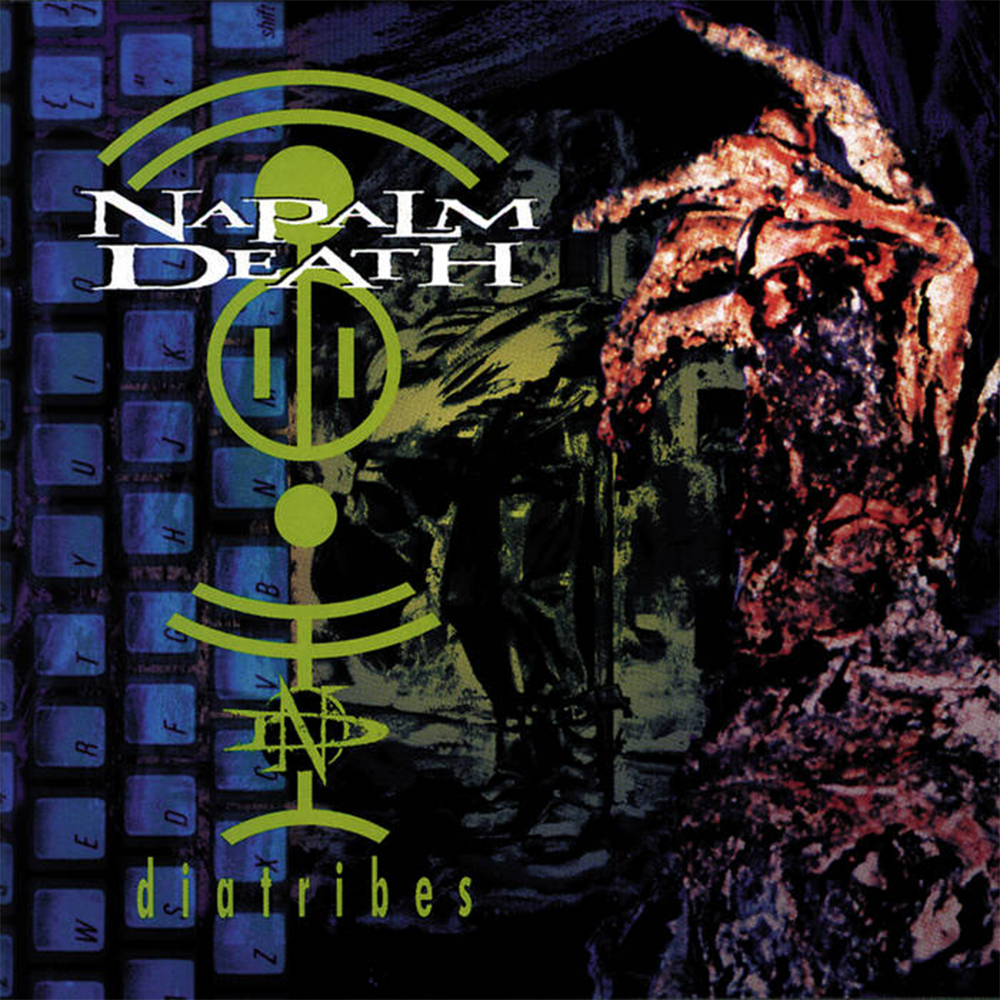 Their second album of ’90s experimentation, and sixth overall, is a deeply frustrating listen. Much like Anthrax’s “Volume 8: The Threat Is Real,” this would be a well-received slab of groove-ish metal if it were made by any other band. With clean guitar and singing, “Diatribes” is tied with “Throes of Joy in the Jaws of Defeatism” (see #11) as Napalm Death at its most unrecognizable. (Greenway, apparently being the only lucid one, was kicked out after the record’s release for expressing concern that the band had lost its way. He’d rejoin the following year.) This is consistently engaging and a whole lotta fun, though, and features excellent musicianship—especially Hererra’s nimble drumming—throughout. “Diatribes,” then, is worth checking out mostly because it’s a puzzling curio in their catalog.
Their second album of ’90s experimentation, and sixth overall, is a deeply frustrating listen. Much like Anthrax’s “Volume 8: The Threat Is Real,” this would be a well-received slab of groove-ish metal if it were made by any other band. With clean guitar and singing, “Diatribes” is tied with “Throes of Joy in the Jaws of Defeatism” (see #11) as Napalm Death at its most unrecognizable. (Greenway, apparently being the only lucid one, was kicked out after the record’s release for expressing concern that the band had lost its way. He’d rejoin the following year.) This is consistently engaging and a whole lotta fun, though, and features excellent musicianship—especially Hererra’s nimble drumming—throughout. “Diatribes,” then, is worth checking out mostly because it’s a puzzling curio in their catalog.
Play it again: “Greed Killing”
Skip it: “Cold Forgiveness”
14. Inside the Torn Apart (1997)
 This album largely walks back the poor decision-making of the last few years, meaning it has a few upsides: the kinda-sorta grindcore is closer to what they’re known for (and a better fit) than its predecessors, and it’s got lots of clever riffing and spritely playing. The one downside, however, is glaring: because Greenway didn’t have any input, the entire record is filled with nonsense like “Trapping the standpoint / Local disjoint / More to protect / Than to reject” and “There is no defense like this confidence / Ideas dawn upon seeking relevance.” The incoherent writing makes G.W. Hegel seem like George Orwell, and it goes all the way down to the title. Similar to “Diatribes,” this is an oddity that’s best left for completists.
This album largely walks back the poor decision-making of the last few years, meaning it has a few upsides: the kinda-sorta grindcore is closer to what they’re known for (and a better fit) than its predecessors, and it’s got lots of clever riffing and spritely playing. The one downside, however, is glaring: because Greenway didn’t have any input, the entire record is filled with nonsense like “Trapping the standpoint / Local disjoint / More to protect / Than to reject” and “There is no defense like this confidence / Ideas dawn upon seeking relevance.” The incoherent writing makes G.W. Hegel seem like George Orwell, and it goes all the way down to the title. Similar to “Diatribes,” this is an oddity that’s best left for completists.
Play it again: “Breed to Breathe”
Skip it: “The Lifeless Alarm”
13. Scum (1987)
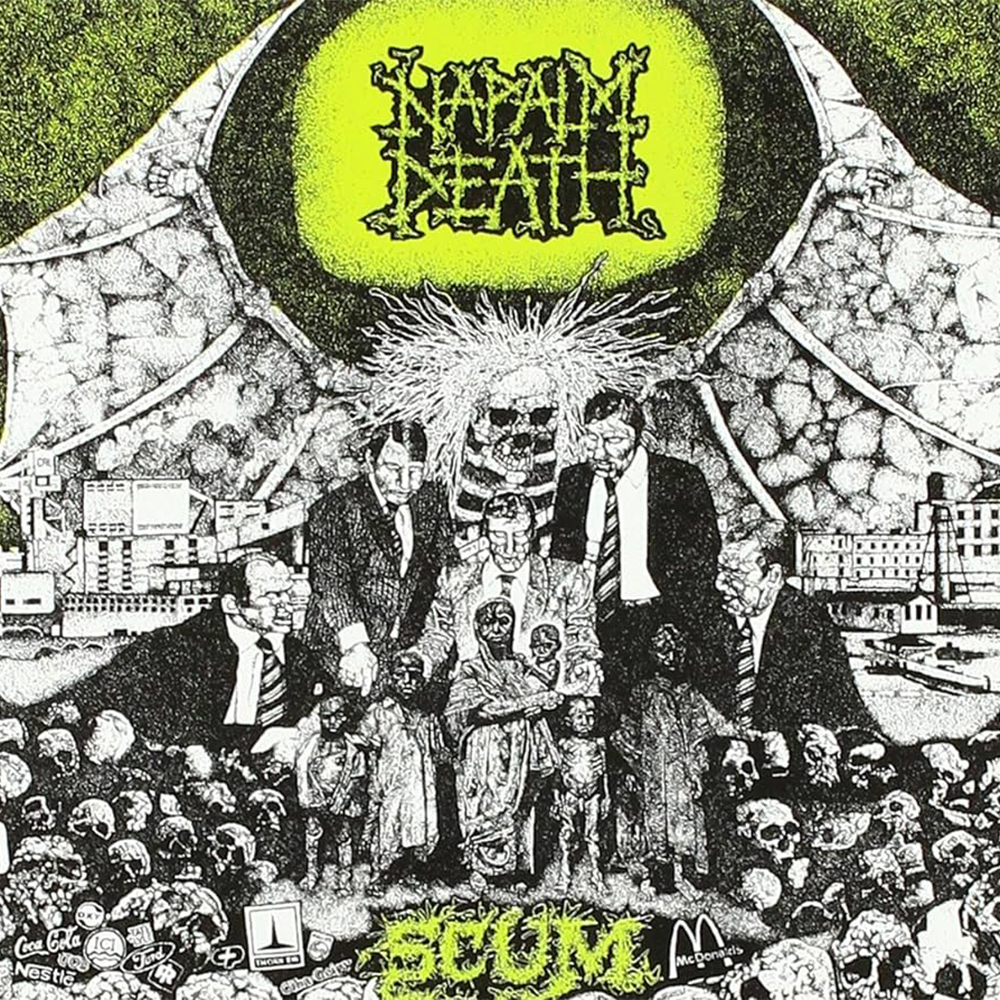 Their influential debut is (probably?) the beginning of grindcore, and is also their grind-iest. At 28 songs in 33 minutes, this is for people whose attention spans make moths seem focused. It feels closer to a split album, though, due to there being a different lineup for each side. (Former drummer Mick Harris is the only constant.) The rabid dog barking from Side A’s Nicholas “Nik Napalm” Bullen and Side B’s Lee Dorian often sounds like an automatic weapon randomly jamming. Lyrically, the career-long themes of anti-capitalism (“Systematic rape of nature / Profit precedes need / Maintaining economic stature / Steal the fruit, yet leave no seed”) and anti-religion (“Your morality is hypocrisy / Obsessive self-esteem / Enforcing your ideals / Your puritanical dream”) are firmly established from the outset. “Scum” is an important record for the band and for the genre, but it isn’t an interesting one.
Their influential debut is (probably?) the beginning of grindcore, and is also their grind-iest. At 28 songs in 33 minutes, this is for people whose attention spans make moths seem focused. It feels closer to a split album, though, due to there being a different lineup for each side. (Former drummer Mick Harris is the only constant.) The rabid dog barking from Side A’s Nicholas “Nik Napalm” Bullen and Side B’s Lee Dorian often sounds like an automatic weapon randomly jamming. Lyrically, the career-long themes of anti-capitalism (“Systematic rape of nature / Profit precedes need / Maintaining economic stature / Steal the fruit, yet leave no seed”) and anti-religion (“Your morality is hypocrisy / Obsessive self-esteem / Enforcing your ideals / Your puritanical dream”) are firmly established from the outset. “Scum” is an important record for the band and for the genre, but it isn’t an interesting one.
Play it again: “C.S.”
Skip it: “Dragnet”
12. From Enslavement to Obliteration (1988)
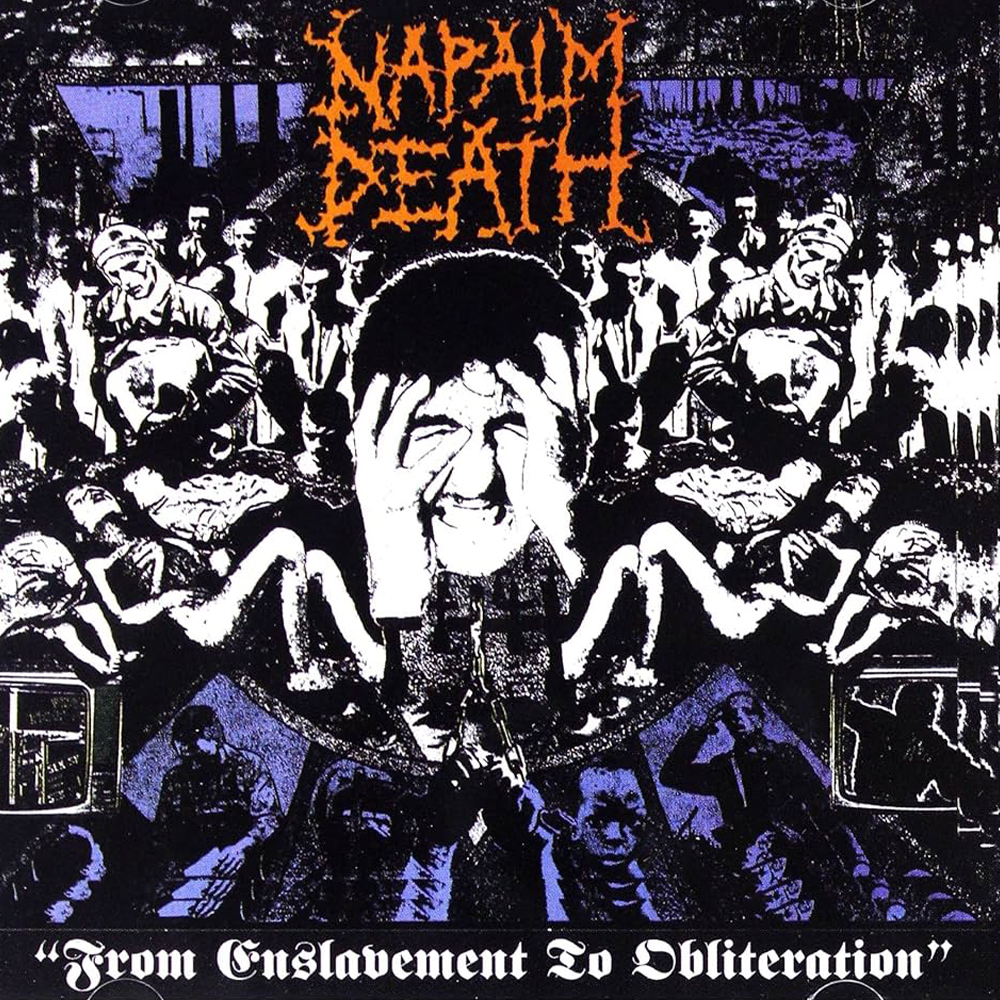 ND’s second full-length is their first one that feels like an actual album. With a stable lineup—Dorian, Bill Steer, Embury (his first appearance), and Harris—throughout, it sounds like it’s from a single entity. What a concept. As such, the songwriting feels unified, likely from Embury’s steady hand. Even early on, his addition proves he was and is the band’s heart. The hardcore tendencies of “Scum” are rightly jettisoned here, allowing the band to fully lean into the batshit extremity. Fittingly, Dorian, perhaps realizing this was his last go-round with them, growls and snarl-shrieks with purpose about well-worn topics like capitalism, animal rights, and racism. “Scum” is the band’s first record, but “From Enslavement to Obliteration” is where they truly began.
ND’s second full-length is their first one that feels like an actual album. With a stable lineup—Dorian, Bill Steer, Embury (his first appearance), and Harris—throughout, it sounds like it’s from a single entity. What a concept. As such, the songwriting feels unified, likely from Embury’s steady hand. Even early on, his addition proves he was and is the band’s heart. The hardcore tendencies of “Scum” are rightly jettisoned here, allowing the band to fully lean into the batshit extremity. Fittingly, Dorian, perhaps realizing this was his last go-round with them, growls and snarl-shrieks with purpose about well-worn topics like capitalism, animal rights, and racism. “Scum” is the band’s first record, but “From Enslavement to Obliteration” is where they truly began.
Play it again: “Mentally Murdered”
Skip it: “Evolved as One”
11. Throes of Joy in the Jaws of Defeatism (2020)
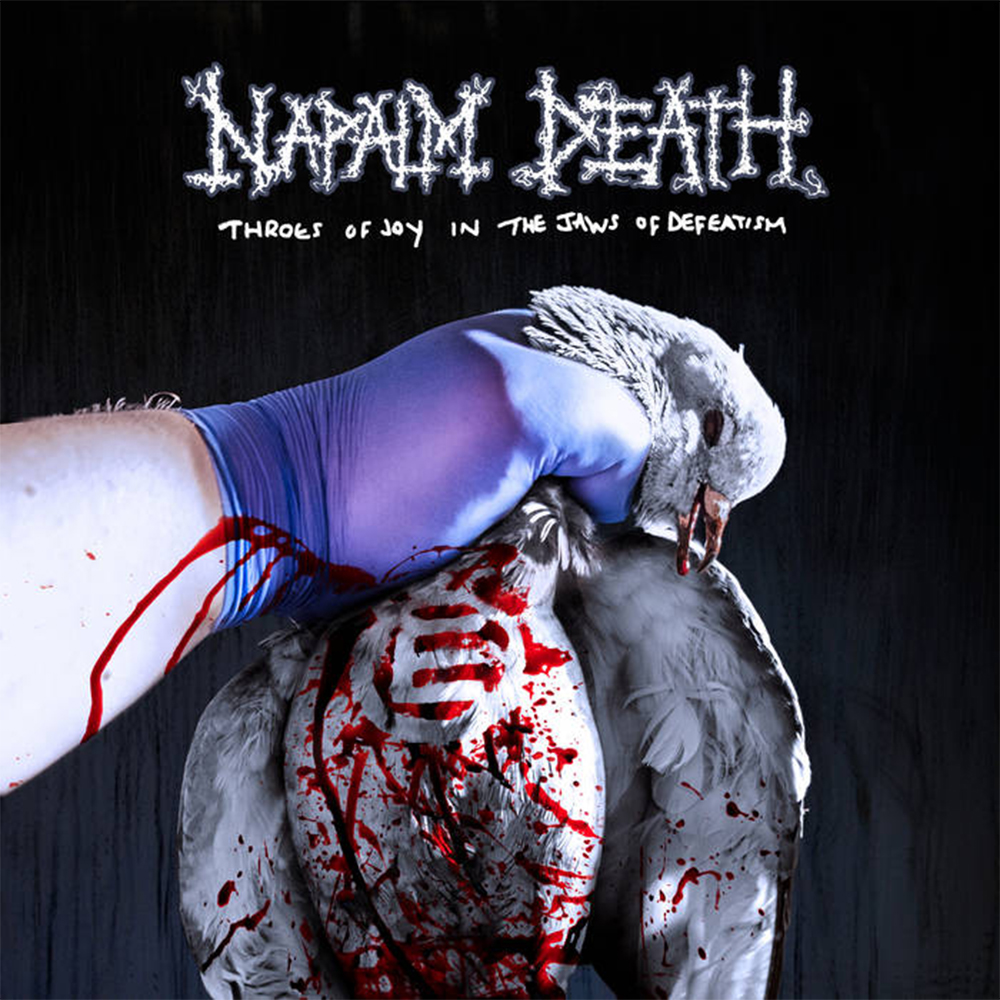 ND’s most recent album finds them taking the weirdness and experimentalism of “Apex” (see below) and running with it to baffling and fascinating new levels. A Napalm Death song without guitar? Seriously? Indeed, a chunk of this finds them straying the furthest they’ve ever been from extreme music. “Throes of Joy in the Jaws of Defeatism” still sounds like them, and Greenway’s vocals are as gurgle-y wet as ever, but there’s a notable lack of insanity here. Some of the songwriting is more basic than sodium hydroxide. Maybe that’s because the lyrical theme is that humans are terrible to each other because we give into the stuff that separates us—racism, capitalism, religion, disinformation—instead of finding commonalities. In other words, “Can’t we all just fucking get along?” Despite being least representative of what Napalm Death does, “Throes” is probably their most easily digestible record.
ND’s most recent album finds them taking the weirdness and experimentalism of “Apex” (see below) and running with it to baffling and fascinating new levels. A Napalm Death song without guitar? Seriously? Indeed, a chunk of this finds them straying the furthest they’ve ever been from extreme music. “Throes of Joy in the Jaws of Defeatism” still sounds like them, and Greenway’s vocals are as gurgle-y wet as ever, but there’s a notable lack of insanity here. Some of the songwriting is more basic than sodium hydroxide. Maybe that’s because the lyrical theme is that humans are terrible to each other because we give into the stuff that separates us—racism, capitalism, religion, disinformation—instead of finding commonalities. In other words, “Can’t we all just fucking get along?” Despite being least representative of what Napalm Death does, “Throes” is probably their most easily digestible record.
Play it again: “Fuck the Factoid”
Skip it: “Joie de Ne Pas Vivre”
10. Harmony Corruption (1990)
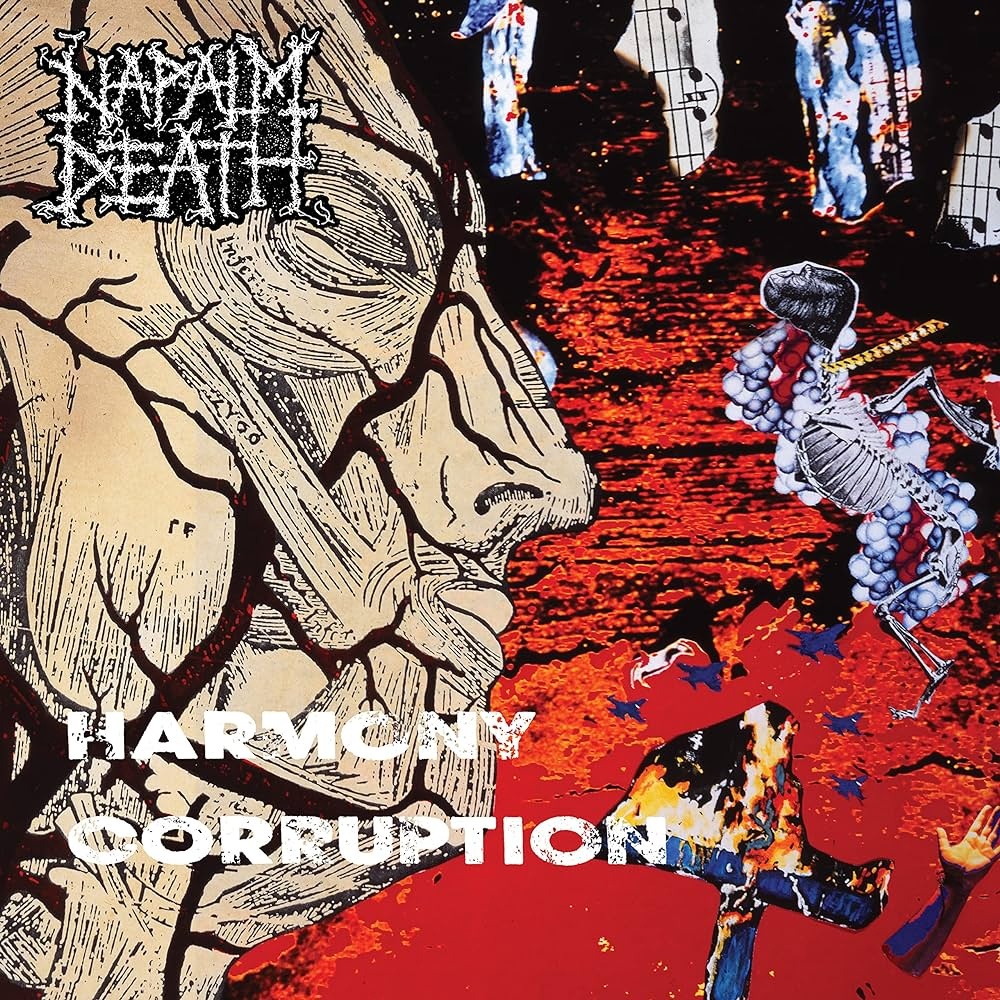 In which Napalm Death go to America and team with Scott Burns to make a pretty good death metal record. Here, the band trades out Dorian and Steer for Greenway and guitarists Mitch Harris and Jesse Pintado, respectively, making ND a quintet. Slower tempos allow Mick Harris to (finally) prove he’s more than blast beats. As lyricists, Embury and Greenway aren’t as sharp as they’d later become. Yet, even underdeveloped, the superior writer is clear when you compare the former’s penchant for pseudo-intellectualism (“Reality’s lifeline cuts through me / It manifests my vision conquest”) and the latter’s pithy commentary (“All essence of being turmoil / Your white powder god brings life to the boil”). In a year that saw crucial debuts from Cannibal Corpse, Deicide, and Exhorder—all produced and engineered by Burns, natch—“Harmony Corruption” is equal to them, and sometimes better.
In which Napalm Death go to America and team with Scott Burns to make a pretty good death metal record. Here, the band trades out Dorian and Steer for Greenway and guitarists Mitch Harris and Jesse Pintado, respectively, making ND a quintet. Slower tempos allow Mick Harris to (finally) prove he’s more than blast beats. As lyricists, Embury and Greenway aren’t as sharp as they’d later become. Yet, even underdeveloped, the superior writer is clear when you compare the former’s penchant for pseudo-intellectualism (“Reality’s lifeline cuts through me / It manifests my vision conquest”) and the latter’s pithy commentary (“All essence of being turmoil / Your white powder god brings life to the boil”). In a year that saw crucial debuts from Cannibal Corpse, Deicide, and Exhorder—all produced and engineered by Burns, natch—“Harmony Corruption” is equal to them, and sometimes better.
Play it again: “Circle of Hypocrisy”
Skip it: “Extremity Retained”
9. Words from the Exit Wound (1998)
 The course-correction of their ’90s experimental wandering is nearly complete. There’s a bit of clean singing, sure, but there’s also a sub-two-minute song for the first time since “Utopia Banished” (see below). Despite sounding like themselves on their eighth outing, there’s a tentativeness to the songwriting and playing that suggests they’re not quite comfortable being on the right path. Greenway, meanwhile, thankfully returns as the primary lyricist, offering slick lines like, “Revolution’s children are but a madman’s larvae to be squashed.” He pairs that writing with his best vocal performance of their rough period, where he sounds as if he’s purging all of those bad decisions. “Words from the Exit Wound” is one of two essential records from a largely wasted decade.
The course-correction of their ’90s experimental wandering is nearly complete. There’s a bit of clean singing, sure, but there’s also a sub-two-minute song for the first time since “Utopia Banished” (see below). Despite sounding like themselves on their eighth outing, there’s a tentativeness to the songwriting and playing that suggests they’re not quite comfortable being on the right path. Greenway, meanwhile, thankfully returns as the primary lyricist, offering slick lines like, “Revolution’s children are but a madman’s larvae to be squashed.” He pairs that writing with his best vocal performance of their rough period, where he sounds as if he’s purging all of those bad decisions. “Words from the Exit Wound” is one of two essential records from a largely wasted decade.
Play it again: “Ulterior Exterior”
Skip it: “Next of Kin to Chaos”
8. Apex Predator – Easy Meat (2015)
 Turns out, they weren’t done experimenting. Somehow, goth rock and death rock seeped into their songwriting. So, while “Apex Predator – Easy Meat” is still (mostly) an apeshit grind record, a handful of tracks sound like ND’s attempt at Killing Joke. Thus, your mileage will vary depending on your reaction to that. The upside: with goth and death rock being a substantial portion of the album, this is a tightly-packaged tapestry of ugliness. The lyrical focus this time is capitalism and its ruinous disposability: “I am the invisible smear on your sorely-tempting price tag / And as perishable as your product, I can just be thrown away.” At 40 minutes, it’s their shortest full-length since “Inside,” but it’s just as deranged as anything they’ve done, right down to the cover.
Turns out, they weren’t done experimenting. Somehow, goth rock and death rock seeped into their songwriting. So, while “Apex Predator – Easy Meat” is still (mostly) an apeshit grind record, a handful of tracks sound like ND’s attempt at Killing Joke. Thus, your mileage will vary depending on your reaction to that. The upside: with goth and death rock being a substantial portion of the album, this is a tightly-packaged tapestry of ugliness. The lyrical focus this time is capitalism and its ruinous disposability: “I am the invisible smear on your sorely-tempting price tag / And as perishable as your product, I can just be thrown away.” At 40 minutes, it’s their shortest full-length since “Inside,” but it’s just as deranged as anything they’ve done, right down to the cover.
Play it again: “Smash a Single Digit”
Skip it: the title track
7. Utopia Banished (1992)
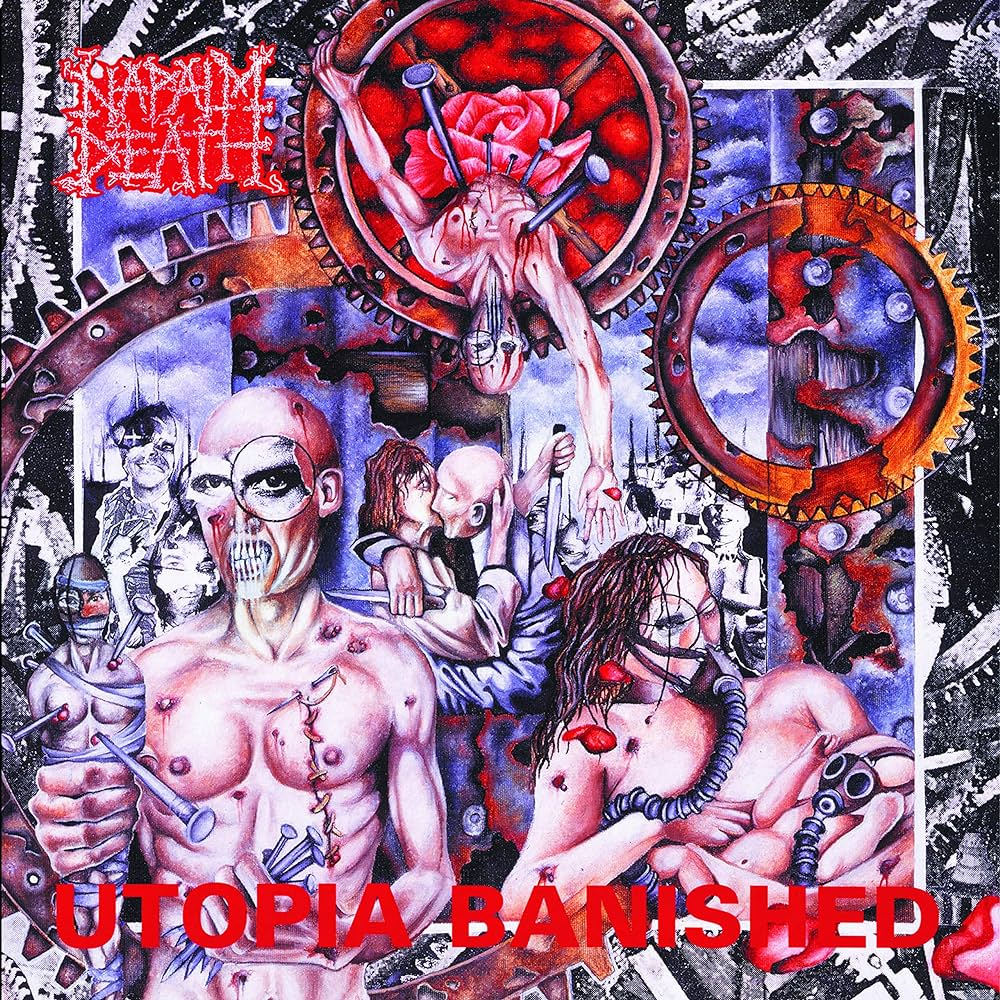 Napalm Death’s fourth album is the other essential one from the ’90s. Perhaps having realized that recording in America with Burns was a mistake, they wisely returned to the UK and chose Colin Richardson as producer. The resulting grind record is better-engineered and better-written than “Harmony.” Here, the quintet—Greenway, Pintado, Harris, Embury, and the addition of drummer Danny Herrera—finally gels, allowing the band to attack their best material to this point. The only downside is that the album too often devolves into vague complaints about undefined antagonists like, “You mock and degrade my friends and aims / Tempting drastic actions, baiting me.” Still, there’s a reason this has been used as a rough blueprint for every album below this one.
Napalm Death’s fourth album is the other essential one from the ’90s. Perhaps having realized that recording in America with Burns was a mistake, they wisely returned to the UK and chose Colin Richardson as producer. The resulting grind record is better-engineered and better-written than “Harmony.” Here, the quintet—Greenway, Pintado, Harris, Embury, and the addition of drummer Danny Herrera—finally gels, allowing the band to attack their best material to this point. The only downside is that the album too often devolves into vague complaints about undefined antagonists like, “You mock and degrade my friends and aims / Tempting drastic actions, baiting me.” Still, there’s a reason this has been used as a rough blueprint for every album below this one.
Play it again: “Dementia Access” > “Christening of the Blind” > “The World Keeps Turning,” their best three-song run of the ’90s
Skip it: “Discordance”
6. Time Waits for No Slave (2009)
 ND’s thirteenth album is like binging on chocolate and getting a stomach ache. Which is to say: there’s too much (of a good thing) here. 50 minutes of grind is overkill, even if the material has, like, a dozen of their coolest riffs, some of which are also the band’s catchiest. A handful of songs are dangerously close to traditional song structure, offering some of their hookiest material to this point. A few choruses even veer dangerously close to Fear Factory territory. The album’s throughline is detachment from reality and humanity, largely because of being worked to death. Even so, it’s got some rare positivity from Greenway, such as “Love is the wild-eyed antidote to cold imperatives.” This certainly isn’t their sharpest record, but it might be the lowest barrier of entry for grind n00bs.
ND’s thirteenth album is like binging on chocolate and getting a stomach ache. Which is to say: there’s too much (of a good thing) here. 50 minutes of grind is overkill, even if the material has, like, a dozen of their coolest riffs, some of which are also the band’s catchiest. A handful of songs are dangerously close to traditional song structure, offering some of their hookiest material to this point. A few choruses even veer dangerously close to Fear Factory territory. The album’s throughline is detachment from reality and humanity, largely because of being worked to death. Even so, it’s got some rare positivity from Greenway, such as “Love is the wild-eyed antidote to cold imperatives.” This certainly isn’t their sharpest record, but it might be the lowest barrier of entry for grind n00bs.
Play it again: “Diktat”
Skip it: “Larceny of the Heart”
5. Utilitarian (2012)
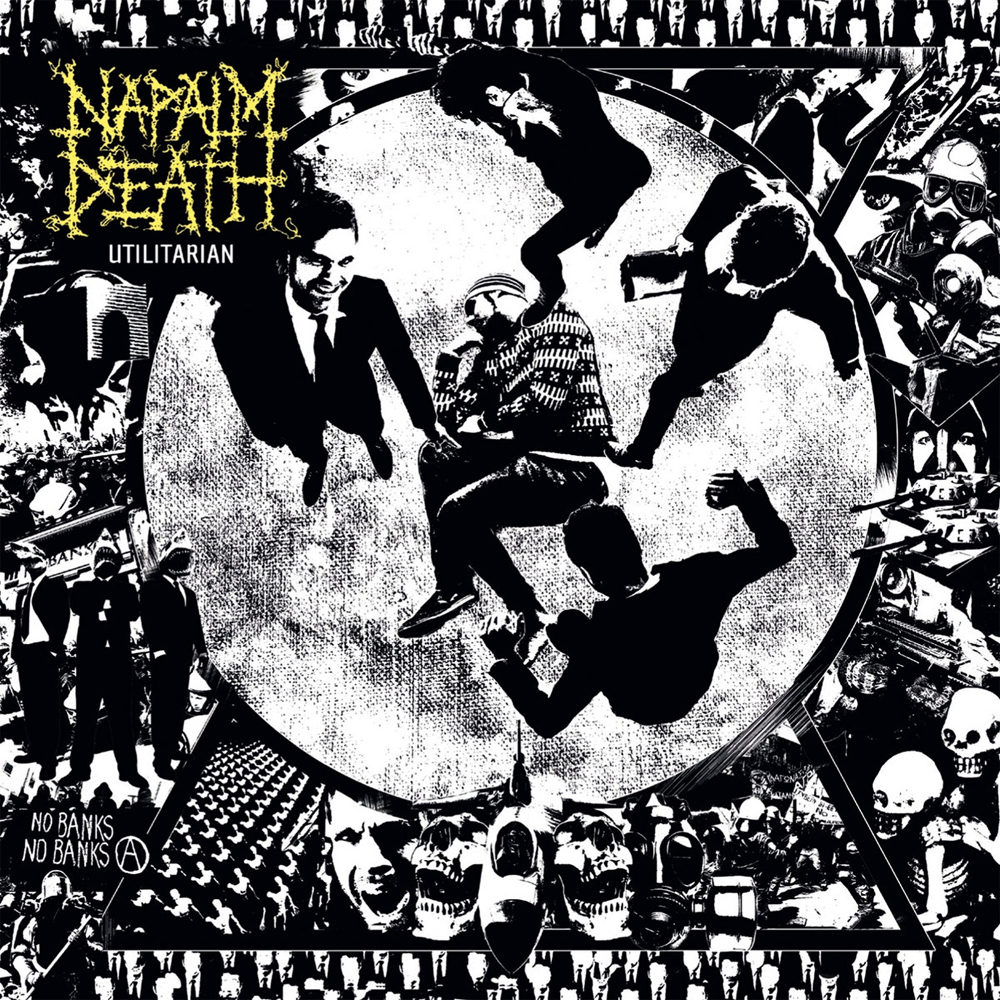 “Utilitarian” offers a helluva pitch: “What if we made ‘Time Waits’ again, but more psychotic and a little weirder?” (To wit: John Zorn shows up to play some seriously demented sax, and there’s more singing here than on any previous album.) Indeed, the band’s fourteenth full-length might be their most intense—including Herrera’s career-best playing—or at least the most intense one since “Scum.” That might explain the album cover’s callback. ND play like they’re trying to out-run irrelevance and/or to beat back time itself. This is an exhilarating, 45-minute sprint right off the fucking cliff. This is true of the lyrics, too: “Death will take us all in the end / Prepare for bitterness, but live it ’til the end.” Self-destruction isn’t supposed to sound this vital. Tyler Durden would approve.
“Utilitarian” offers a helluva pitch: “What if we made ‘Time Waits’ again, but more psychotic and a little weirder?” (To wit: John Zorn shows up to play some seriously demented sax, and there’s more singing here than on any previous album.) Indeed, the band’s fourteenth full-length might be their most intense—including Herrera’s career-best playing—or at least the most intense one since “Scum.” That might explain the album cover’s callback. ND play like they’re trying to out-run irrelevance and/or to beat back time itself. This is an exhilarating, 45-minute sprint right off the fucking cliff. This is true of the lyrics, too: “Death will take us all in the end / Prepare for bitterness, but live it ’til the end.” Self-destruction isn’t supposed to sound this vital. Tyler Durden would approve.
Play it again: “Orders of Magnitude”
Skip it: “Circumspect”
4. Smear Campaign (2006)
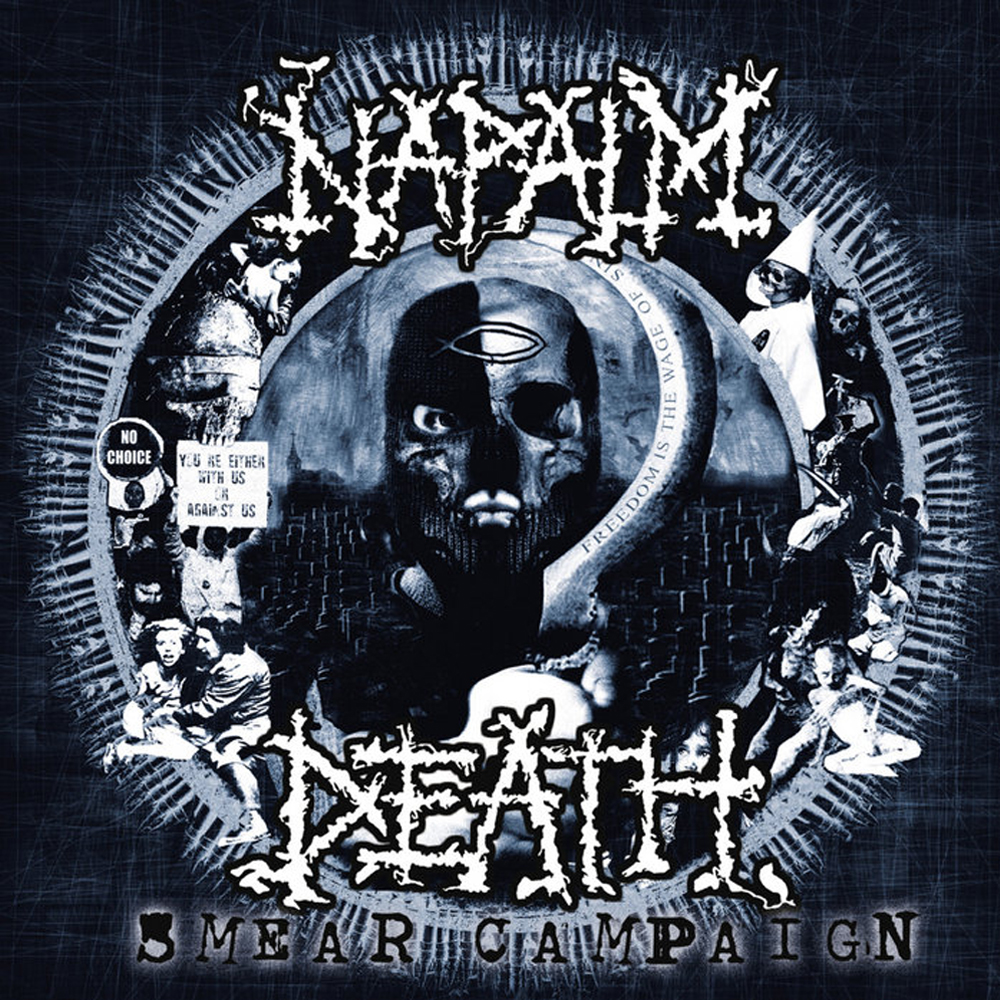 The three previous records (see below) saw ND do the Black Dahlia and/or Cannibal Corpse thing of making records as variations on a theme. Perhaps as a way to break up that monotony, Harris and Embury brought back some of their ’90s experimentalism—namely, mid-tempo groove metal, clean singing, and something approaching a hook on the final two songs—but here it’s correctly sprinkled on top of their songwriting instead of baked in. Lyrically, this is an album-long tirade about the evils of organized religion. (That sound you hear is Bill Maher masturbating.) And while that’s certainly preaching, Greenway’s writing elevates triteness with succinct vitriol like “Where was the help previously when appeals went unheard? / Huge effort expended on devotion for nothing in return.” “Smear” almost makes militant atheists seem tolerable.
The three previous records (see below) saw ND do the Black Dahlia and/or Cannibal Corpse thing of making records as variations on a theme. Perhaps as a way to break up that monotony, Harris and Embury brought back some of their ’90s experimentalism—namely, mid-tempo groove metal, clean singing, and something approaching a hook on the final two songs—but here it’s correctly sprinkled on top of their songwriting instead of baked in. Lyrically, this is an album-long tirade about the evils of organized religion. (That sound you hear is Bill Maher masturbating.) And while that’s certainly preaching, Greenway’s writing elevates triteness with succinct vitriol like “Where was the help previously when appeals went unheard? / Huge effort expended on devotion for nothing in return.” “Smear” almost makes militant atheists seem tolerable.
Play it again: “Shattered Existence”
Skip it: “Weltschmerz”
3. The Code Is Red... Long Live The Code (2005)
 Once the Iraq War turned into Vietnam 2: Electric Boogaloo, protest music became en vogue again. Of course, Napalm Death jumped in. Here, there’s a bit of progressive songwriting that occasionally creeps into their grindy tempests. But this is Greenway’s show, having finally been given an entire record to seethe and spew. And while he tends to his hobby horses of racism and capitalism, he mostly uses the extra space to go off on Dubya’s bullshit war (“Ten thousand corpses in the wake of his whims / Count many thousands more on the way to obedience”) and the media’s complicity (“They’ll take us up to fever pitch and watch intolerance spread / And you’ll be none the wiser with a paranoid mindset”). If they’d hacked off the two ill-fitting songs at the end, this’d be their definitive album.
Once the Iraq War turned into Vietnam 2: Electric Boogaloo, protest music became en vogue again. Of course, Napalm Death jumped in. Here, there’s a bit of progressive songwriting that occasionally creeps into their grindy tempests. But this is Greenway’s show, having finally been given an entire record to seethe and spew. And while he tends to his hobby horses of racism and capitalism, he mostly uses the extra space to go off on Dubya’s bullshit war (“Ten thousand corpses in the wake of his whims / Count many thousands more on the way to obedience”) and the media’s complicity (“They’ll take us up to fever pitch and watch intolerance spread / And you’ll be none the wiser with a paranoid mindset”). If they’d hacked off the two ill-fitting songs at the end, this’d be their definitive album.
Play it again: “Vegetative State”
Skip it: “Morale” and “Our Pain is Their Power” (obviously)
2. Order of the Leech (2002)
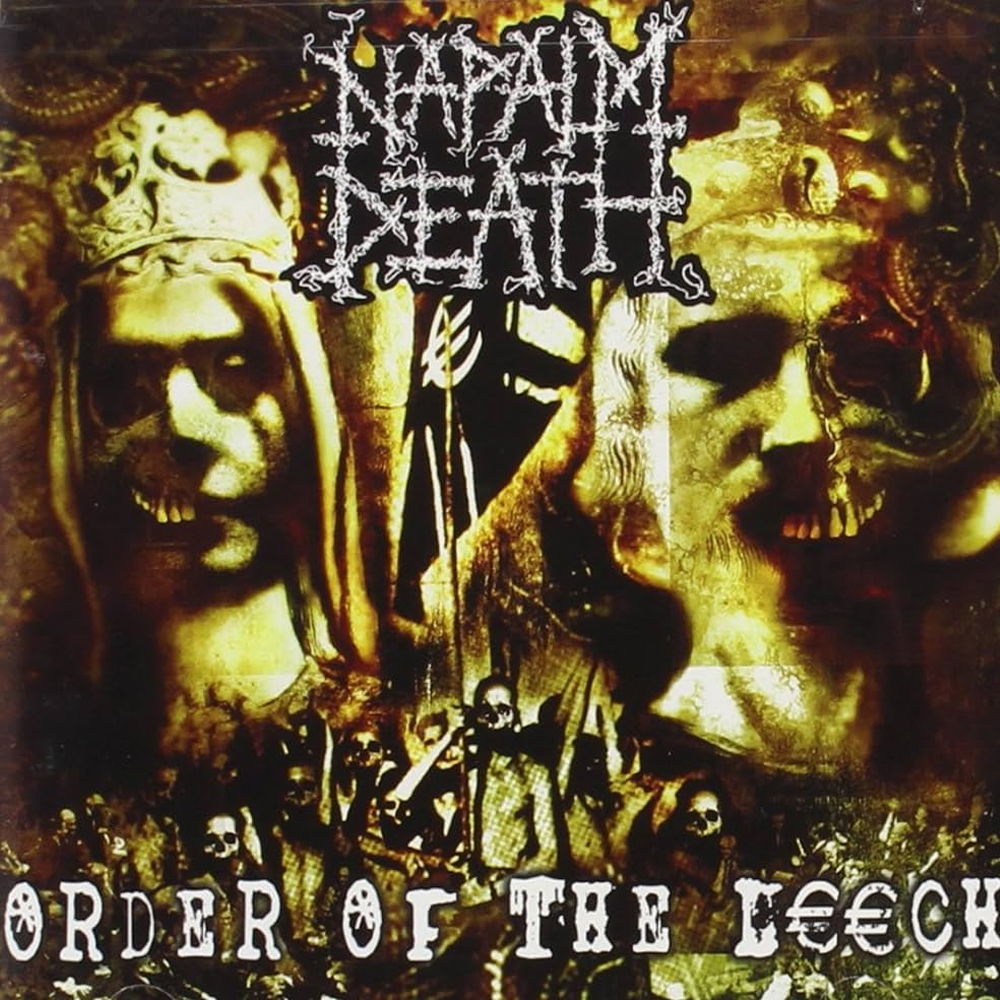 Greenway spleen-venting about 9/11 and the US’s subsequent imperialist policy is about as surprising as the Sun rising in the East. Thus, here we are: “Must have peace though the megaton decree / ‘Must have peace’ warn the global police.” Really, though, the throughline of “Order of the Leach” is Greenway’s disgust of both the US (“Two evils grow / Willingly exchanging blows / Pentagon’s financial goals exposed”) and the UK (“Number-one dysfunctional family / But judge not the aristocracy”). He also takes time to take down pro-lifers’ logic: “If, as you say, life is so sacred / Why is quality of life an afterthought?” The rest of the band expertly tear through the material, with Hererra continuing to prove he’s the best drummer in grind. This focus, both lyrically and musically, resulted in the band’s second consecutive no-skips classic.
Greenway spleen-venting about 9/11 and the US’s subsequent imperialist policy is about as surprising as the Sun rising in the East. Thus, here we are: “Must have peace though the megaton decree / ‘Must have peace’ warn the global police.” Really, though, the throughline of “Order of the Leach” is Greenway’s disgust of both the US (“Two evils grow / Willingly exchanging blows / Pentagon’s financial goals exposed”) and the UK (“Number-one dysfunctional family / But judge not the aristocracy”). He also takes time to take down pro-lifers’ logic: “If, as you say, life is so sacred / Why is quality of life an afterthought?” The rest of the band expertly tear through the material, with Hererra continuing to prove he’s the best drummer in grind. This focus, both lyrically and musically, resulted in the band’s second consecutive no-skips classic.
Play it again: yes
Skip it: no
1. Enemy of the Music Business (2000)
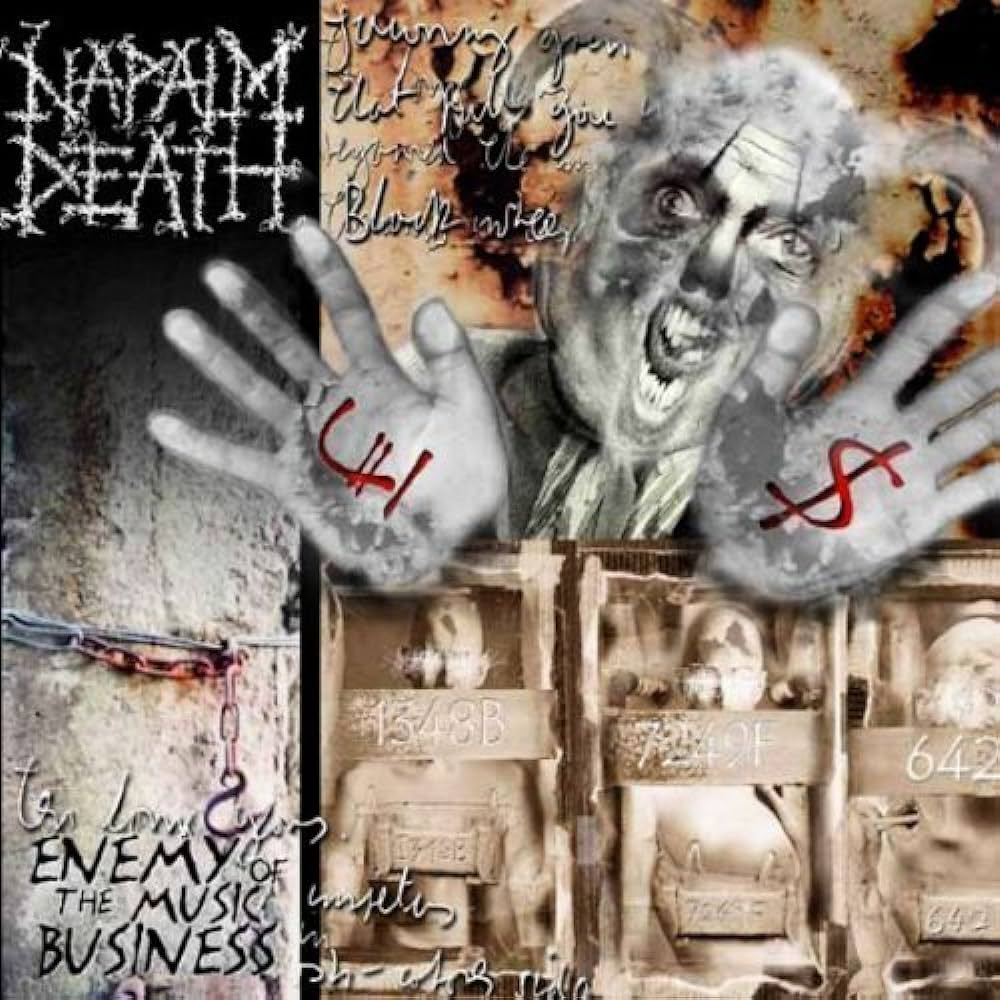 “Enemy of the Music Business” is the band’s other no-skips album. And as a near-album-long diatribe (sorry) about the music biz, it’s also their most bitter. Emerging as one the best writers in extreme music, Greenway’s descriptions (“They’ll scavenge your emotions / And leave you diseased / They’d steal a last possession / And smile as you concede”) and insults (“cultural slime” and “leeching clique,” among many others) make this his some of his most compelling writing. He and the rest of the band attack these songs with the kind of focused fury usually reserved for a John Wick movie. The only drawback—a gripe, really—is the dated production from Simon Efemey and Russ Russell, a bone-dry and brittle sound that plagued early 2000s metal. Still, “Enemy” remains the band’s premier record, and among the best grind records of this century.
“Enemy of the Music Business” is the band’s other no-skips album. And as a near-album-long diatribe (sorry) about the music biz, it’s also their most bitter. Emerging as one the best writers in extreme music, Greenway’s descriptions (“They’ll scavenge your emotions / And leave you diseased / They’d steal a last possession / And smile as you concede”) and insults (“cultural slime” and “leeching clique,” among many others) make this his some of his most compelling writing. He and the rest of the band attack these songs with the kind of focused fury usually reserved for a John Wick movie. The only drawback—a gripe, really—is the dated production from Simon Efemey and Russ Russell, a bone-dry and brittle sound that plagued early 2000s metal. Still, “Enemy” remains the band’s premier record, and among the best grind records of this century.
Play it again: of course
Skip it: nah




